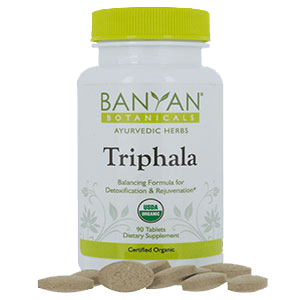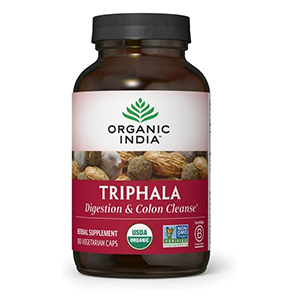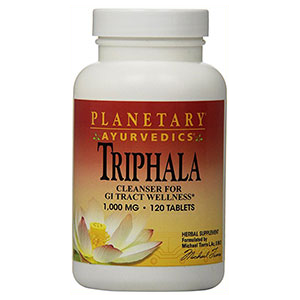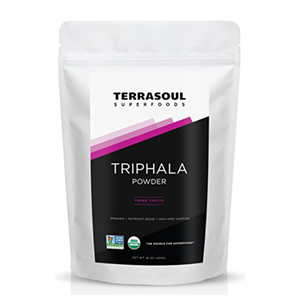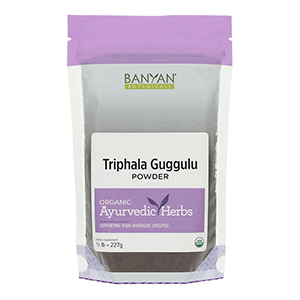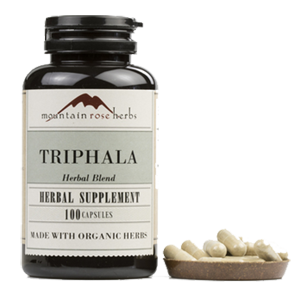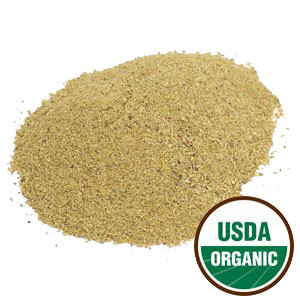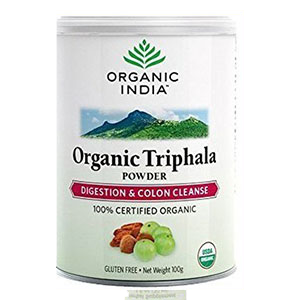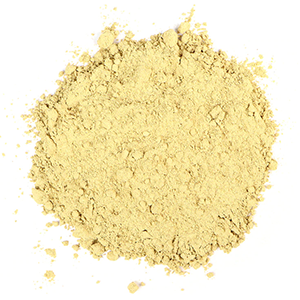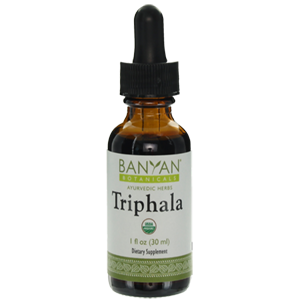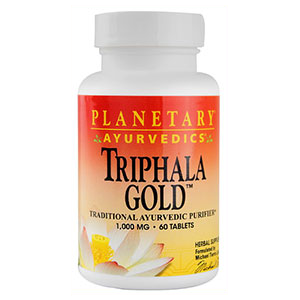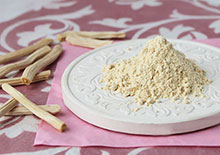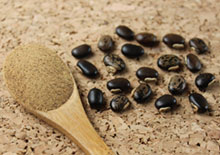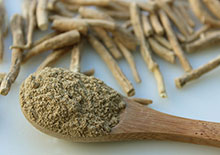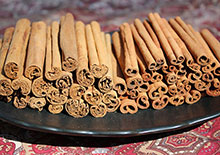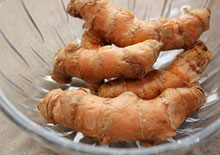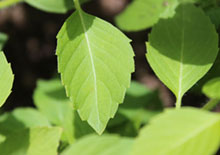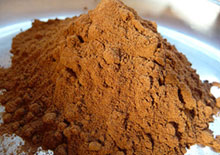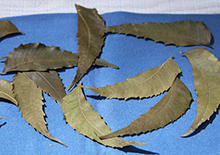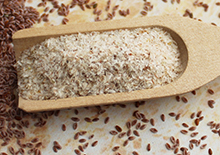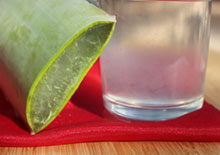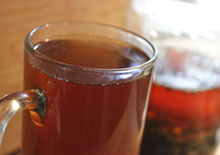- Home
- Ayurvedic Herbs
- Triphala Powder
Triphala Powder, An Ayurvedic Formula for Healthy Bowels
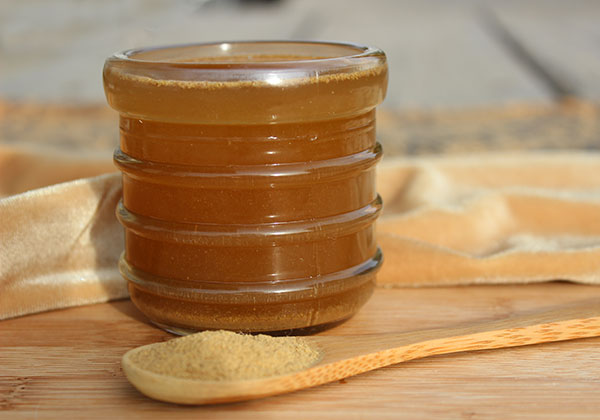
Triphala powder is a specific Ayurvedic formulation composed of three dried fruits: amalaki, haritaki and bibhitaki. It is one of India's most valued and commonly utilized household herbs.
Used on a daily basis as a digestive tonic and for improved bowel regularity, it is believed to eliminate the root cause of many diseases that often begin from stagnant conditions and gastrointestinal imbalance.
Each of the dried ground fruits that make up the powder or "triphala
churna" are known to collectively work to positively potentiate the
qualities of each other, uniquely offering both nutritive as well as
colon cleansing properties.
Consuming triphala tea or tablets therefore helps to gently clear intestinal excess, while simultaneously strengthening digestion and one's ability to assimilate nutrients.
Triphala’s distinctive therapeutic actions are due in part to its special flavor characteristics which include the five tastes: sweet, sour, pungent, bitter and astringent.
For this reason, triphala is considered a "tridoshic" herbal formula, a term referring to the three doshas, Vata, Pitta and Kapha. In the Ayurvedic system these are the primary constitutional forces that govern the human body.
Triphala powder is not energetically too cold or too hot, and is thus well-tolerated by all three body types. Because of its versatility and appropriateness for a wide range of people, it is one of the most frequently prescribed herbal formulations used extensively by Ayurvedic practitioners since the beginning of Vedic times as both a straight herb or an ingredient in many other alchemical compounds.
Triphala can be considered a rasayana tonic because of its rejuvenating attributes that enhance one's strength and regulate immunity. It is notably high in a number of antioxidants, like phenolic constituents and vitamin C, which have been shown to act as immunomodulators as well as prevent oxidative stress.
Bowel irregularity and chronic constipation are common conditions that afflict many individuals worldwide. Herbal laxatives, as a result are one of the most popular products in the health supplement industry. Unlike strong purgatives, however, triphala is safe for long-term use or can be prescribed when symptoms arise.
It is traditionally used as a powder, called triphala churna, stirred into hot water and consumed as a steeped lukewarm powder-infused liquid. It is generally recommended that you take triphala supplements or "tea" on an empty stomach first thing in the morning and/or an hour before bed, for several months once or twice daily for highest health benefits.
The amount of triphala powder can be adjusted according to one's health goals and objectives. Triphala can be used in smaller doses for its nutritive and cleansing attributes that can gently remove excess "ama" or toxins from the body, working as a mild blood purifier without causing intense detox reactions. Or likewise, it can be employed in larger doses to promote stronger laxative qualities to alleviate constipated bowels and intestinal stagnation.
In addition, triphala powder supplementation is regarded as a potent medicinal substance for its antiarthritic, anti-inflammatory and antiviral qualities. It is known to be beneficial for body weight management, reducing serum cholesterol, increasing dental hygiene, clearing the skin and improving the eyesight.
The results of a study published in Alternative Therapies in Health and Medicine revealed that triphala and its constituents can counter the effects of high dietary fat intake and have "the potential for use as antiobesity agents with desirable lipid-profile modulating properties."
While triphala enhances the process of digestion and elimination, it also as a side-effect improves the functioning of the liver, gallbladder and kidneys by purifying the blood and opening up the detoxification pathways. Triphala powder consumed daily in warm water can be a highly effective treatment for removing congestion and reducing stress on these eliminatory channels and organ systems.
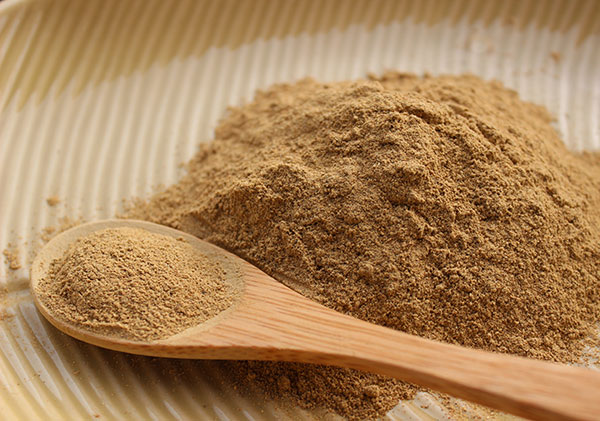
What is Triphala Powder?
The term triphala literally means "three fruits", tri (three) and phala (fruit). This is because it is not a plant itself but an herbal formulation that consists of three specific and rather unusual looking fruits indigenous to the subcontinent of India. These are amalaki (Emblica officinalis), haritaki (Terminalia chebula) and bibhitaki (Terminalia belerica). Each of these dried fruits possess different properties that help to provide for its well-rounded attributes and synergistic effects.
Triphala powder, usually created from equal proportions of these dried fruits, is one of the foundational herbal formulas of Ayurveda, the traditional system of East Indian medicine. Its referenced use is found in many ancient Hindu texts, like the Charaka Samhita and Sushruta Samhita, where it is infused as straight "triphala churna" powder into hot water and consumed as a warm tea-like liquid, or is likewise utilized as an ingredient in many complex Ayurvedic preparations.
According to the book Rasayana, Ayurvedic Herbs for Longevity and Rejuvenation,
there are differing opinions about proportions used for triphala
formulations. Traditionally, one part of each of the three fruits, by
weight, is standard, but other recipes include:
One part haritaki, two parts bibhitaki and three parts amalaki, by weight.
One part haritaki, two parts bibhitaki and four parts amalaki, by weight.
About Triphala Fruits: Amalaki, Haritaki and Bibhitaki
1) Amalaki or Amla - Is a type of fruit, also referred to as Indian gooseberry, is from the species Emblica officinalis (or Phyllanthus emblica), a sacred Hindu tree believed to be protected by the God Vishnu. The amla tree is ritually worshiped on the Hindu holiday called Amalaki Ekadashi. All parts of the tree are useful, but the dried ground fruit is particularly applied in medicinal preparations. It is also used fresh as an ingredient in chutney.
Of the three fruits, amla is the one most commonly used as a super fruit variety, because of its concentrated source of natural vitamin C content. Amla fruit is cooling in nature, helpful for balancing Pitta when excess heat or inflammation is present. It is cleansing to the body and is known to improve liver function and boost immunity.
It is composed of the primary tastes sour and astringent with secondary bitter, pungent and sweet flavors. Some of the phytochemical compounds include: nicotinic acid, riboflavin, tannins, carotene as well as vitamin C.
2) Haritaki - Is a small ribbed nut-like fruit from the tree species Terminalia chebula. The center seed is usually removed and the fleshy firm pulp is the part dried to make haritaki powder. It has a heating energy and is identified by its scraping actions which help to eliminate toxins.
There are approximately seven different varieties of haritaki fruits, including vijaya, rohini, abhaya, putana, amrita, chetaki and jivanti. The vijaya variety is usually the one preferred over others when making triphala churna.
It is comprised of the tastes: sweet, sour, pungent, bitter and astringent. Haritaki is considered one of the best herbs for balancing the Vata dosha. Some of the phytochemical compounds include: anthraquinones, tannins and other polyphenolic compounds, like glycosides and triterpenes.
3) Bibhitaki - Also referred to as beleric, is the fruit of the Terminalia belerica tree species. The fruit pulp has a laxative effect and helps to clear excess mucus accumulation or "ama" from the body. Bibhitaki additionally contains high amounts of polyunsaturated oil content.
It is viewed as a good herb for Kapha constitutions and is primarily astringent in taste with a secondary sweet, bitter and pungent flavor. Some of the phytochemical compounds include: gallic acid, tannic acid and glycosides.
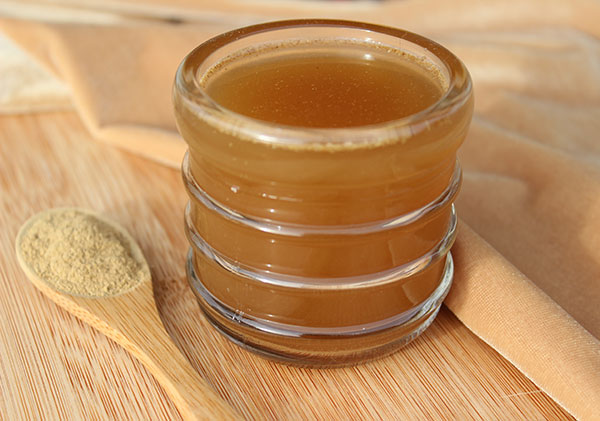
Health Benefits of Triphala
1) Supports Bowel Functions
2) Triphala Powder as a Digestive Tonic
3) Triphala for Weight Loss Properties
4) High in Antioxidants
5) Benefits to the Eyes and Skin
6) Good for Dental Hygiene
Supports Bowel Functions
Ayurveda aims at treating the root cause of disease, not merely alleviating various symptoms. Often, the foundation of this begins in balancing digestive and eliminatory disorders before they start to accumulate, block detoxification pathways and disrupt the flow of other bodily organ systems. This is a preventative approach to illness and disease widely practiced in both Ayurvedic and Chinese medical systems.
Frequently, symptoms like chronic bloating, gas, fatigue, constipation, food cravings, abdominal pain, candida, hormonal imbalance, allergies, headaches and inflammatory disorders can be a sign that there is obstruction and congestion, especially in the large intestine and colon region.
In Ayurveda, the colon is viewed as the seat of Vata, so herbs like
triphala can be very helpful for Vata disorders like constipation or too much
"wind" in the digestive tract, which causes bloating and flatulence.
Banyan Botanicals, Organic Triphala Tablets
It can be used in a dose dependent manner as a gentle, mild or strong laxative. Because of its tridoshic nature, it is appropriate, however, for a wide range of
people when constipation or irregular bowel elimination is an issue.
Regular daily bowel movements are a vital component to health and wellness and a critical part of the detoxification process. Triphala not only helps to support healthy bowel functions and proper stool defecation, as we mentioned, it is additionally purifying to the blood and two other eliminatory organs, the liver and the kidneys.
Triphala, however, is different than other types of herbal laxatives in that it combines both a purgative quality as well as a nutritional component. Containing constituents like bitter anthroquinones, it gently works to stimulate peristaltic actions directly or through the secretion of bile via the gall bladder and liver. It is not, however, depleting to the body with long-term use like other herbal laxatives like senna, cascara sagrada or rhubarb. Unlike these varieties, triphala powders and tablets are also not habit-forming.
A study published in the Journal of Ayurveda and Integrative Medicine comparing the use of both triphala and senna, it was stated that "Triphala gently cleanses the colon and relives symptoms like anorectal blockage, sensation of incomplete evacuation, flatulence, and bloating." In contrast to senna, a strong purgative, triphala powder "strengthens and tones up the musculature of the bowel and does not cause dependence."
Triphala Powder as a Digestive Tonic
Consuming triphala powder as a warm tea mixture supports one's "digestive fire", so that nutrition can be absorbed and waste materials eliminated.
Triphala is also considered to be more of a tonic because of its antioxidant compounds, like vitamin C, as well as its polyunsaturated omega oils.
In addition to providing bowel regularity, it also benefits several areas of digestion such as helping to break down food in the stomach, the catabolism of proteins, fats and carbohydrates in the small intestine and the absorption of any remaining nutrients in the colon.
Digestion is where it all begins. If we can keep this system running smoothly through good dietary practices, sattvic food choices as well as periodic cleansing protocols, we can often prevent many unnecessary related health issues further down the road. For this reason, triphala is recommended and used more often than any other Ayurvedic herbal formulation, as a straight powder or as an ingredient in many traditional herbal preparations.
One of the best parts about triphala is that it can be taken for its cleansing actions without having to significantly alter dietary practices. Of course, we always encourage a health promoting diet and lifestyle along with occasional cleansing regimes but, generally speaking, daily use of triphala tea or tablets over a 1-3 month period can complement most any diet.
Triphala for Weight Loss and Lipid Lowering Properties
Triphala powder is a popular herbal remedy for increasing weight loss when excess body weight or obesity is a chronic issue. Often times these conditions are associated with bowel congestion which further impedes digestive assimilation and liver function.
Although modifying one's diet and exercise activities is highly advised in any weight loss program, triphala can be taken twice daily for several months as a supplemental adjunct for increased effectiveness.
The complete taste spectrum that triphala fruits provide, naturally promotes increased absorption of nutrients, which helps to satisfy the appetite and eliminate food cravings. Triphala powder steeped in hot water or mixed into warm water is therefore frequently recommended over tablets or capsules so that taste sensations can be activated in the mouth.
In research analyzing triphala's actions as an antiobesity agent, it was demonstrated to counter the effects of a high fat diet and was shown to have lipid lowering effects on LDL and total serum cholesterol levels.
Triphala Guggulu
Another classic Ayurvedic preparation for weight management is called "Triphala Guggulu." This is a combination of long pepper, the three triphala fruits and guggulu. Guggulu is a type of plant resin known for its detoxifying actions and is particularly beneficial for increasing digestive fire, encouraging healthy metabolism and removing excess Kapha from the body.
High in Antioxidants
Triphala powder, being a combination of three different fruit varieties, contains a well-rounded amount of antioxidants. It is rich in polyphenols, glycosides, alkaloids and tannins, such as chebulagic acid and gallic acid. According to one study, its specific antioxidative effect is "more efficient due to the combined activity of the individual components."
These compounds help to reduce oxidative stress and prevent free radical damage. The specific substances in triphala powders and supplements also act as immune system modulators, increasing or decreasing immune response depending on what is most appropriate.
In a study published in the Indian Journal of Pharmaceutical Sciences, it was reported that "the use of triphala and its three individual constituents as potential immunostimulants and/or immunosuppressants further suggests them to be a better alternative for allopathic immunomodulators." (*)
In other research, the use of triphala powder was identified to significantly increase beneficial immune cells, cytotoxic T lymphocytes and natural killer cells.
One study conducted on arthritis in mice, it was concluded that "The results obtained clearly indicate the fact that the Indian Ayurvedic herbal formulation triphala has promising anti-inflammatory activity." (*)
Benefits to the Eyes and Skin
Triphala powder is also widely utilized for improving the health of the eyes and for use as supplemental treatment for certain eye diseases like conjunctivitis and early stages of cataracts and glaucoma.
This is predominantly due to its antioxidant-rich compounds like vitamin C and carotene, as well as its blood purifying attributes. As we discuss on our cleansing herbs page, liver cleansing substances often go hand in hand with eyesight and skin improvements.
In research evaluating the anticataract potential of triphala it was demonstrated that "triphala prevents selenite-induced experimental cataractogenesis in vitro and in vivo."
According to the book Rasayana, Ayurvedic Herbs for Longevity and Rejuvenation, "It is alleged that regular use of this compound for 5–6 months can improve eyesight to such an extent that glasses may not be required."
The three fruits in triphala powder are incorporated in a well-known vision improving Ayurvedic formulation called Saptamrita Lauha. Filtered triphala teas can also be used topically as an eyewash using an eye cup or as drops to fortify visual functions and lessen strain on the eyes.
In
clinical research comparing triphala eye drops and the intake of
Saptamrita Lauha tablets, both were shown effective for "computer vision
syndrome" by increasing "ocular strength." (*)
Triphala's
antioxidant content and liver cleansing properties, not only help
increase eye health, but also provide beneficial effects at clearing
skin disorders often associated with toxic overload and liver
stagnation. It can be used internally with turmeric powder to intensify
these features.
Amalaki or amla fruit, being one of the highest sources of vitamin C, also significantly adds to these skin healing qualities.
Good for Dental Hygiene
Triphala contains antimicrobial properties that have been confirmed effective for improving dental hygiene and can be used in water as a type of natural mouthwash.
In the 2014 Journal Periodontal & Implant Science, it was shown that "triphala mouthwash (herbal) is an effective antiplaque agent like 0.2% chlorhexidine. It is significantly useful in reducing plaque accumulation and gingival inflammation [gingivitis], thereby controlling periodontal diseases in every patient. It is also cost effective, easily available, and well tolerable with no reported side effects." (Source)
The Taste of Triphala
Triphala powder, being a tridoshic formula, is very versatile and balancing to all three body types: Vata, Pitta and Kapha.
Triphala's healing qualities are in part due to its mentioned combination of flavors which include bitter, sour, sweet, pungent and astringent. In Ayurveda, the sense of taste, or "Rasa", is considered an important element which when balanced nourishes plasma and feeds the bodily tissues. These taste dynamics are what allows triphala to work on many levels, providing a cleansing yet tonifying effect.
In this regard, it is traditionally consumed as a powder in warm water so that the sense of taste is activated. It is believed that each individual experiences their own unique triphala flavor, depending on what is most needed, with each taste having different effects on the body. These taste sensations can also shift with use as one's health improves.
The potent antioxidants and nutritional compounds found in amalaki, haritaki and bibhitaki give triphala a potent flavor that is not likely to be very pleasing to the palette.
For many Westerners who predominantly lack the bitter and astringent taste in the diet, drinking the tea can be initially strong tasting as these qualities will often be pronounced. Taste perception usually evolves over time, however, as one becomes more balanced.
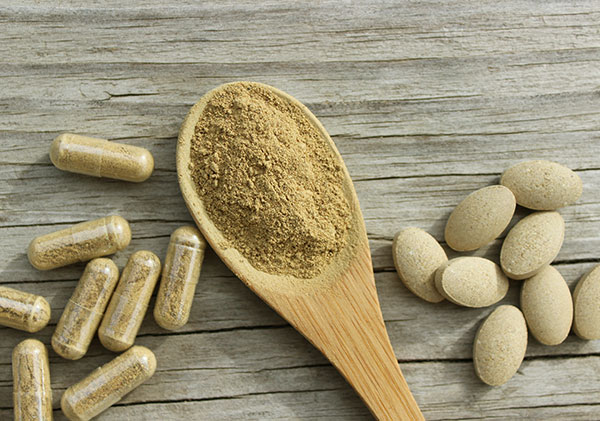
Types of Triphala
- Bulk Powder - Commonly made from equal parts of the three dried fruits: amalaki, haritaki and bibhitaki.
- Tablets or Capsules - Created from the powder in compressed or encapsulated form.
- Liquid Extracts - Liquid extracts are less common but available as an alcohol tincture.
- Formulations - Triphala is frequently used in many traditional Ayurvedic preparations.
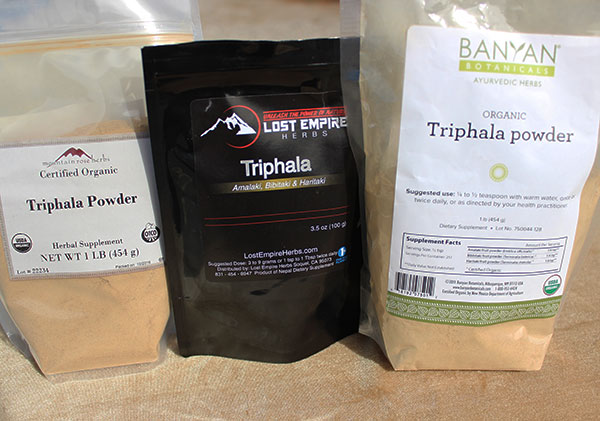
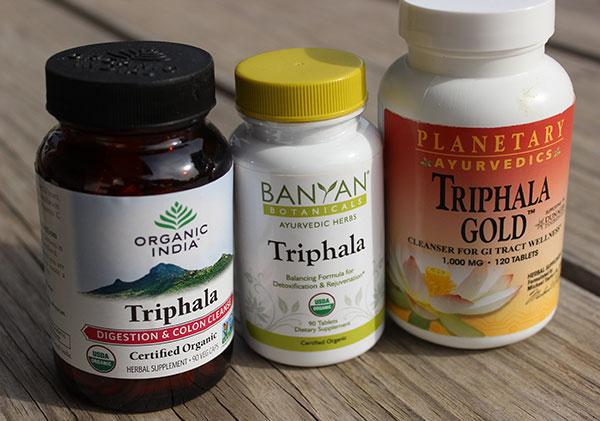
Recommended Organic Triphala Brands
- Banyan Botanicals - organic powder, tablets and liquid extract
- Lost Empire Herbs (Formerly Super Man Herbs) - organic powder
- Organic India - organic capsules and powder
- Mountain Rose Herbs -organic powder and capsules
- Planetary Herbals - organic tablets
- Starwest Botanicals - organic powder
How to Use
By far, the #1 way to use straight triphala is as a warm tea. This is essentially created by infusing triphala powder in hot or warm water and allowing it to sit for at least 20 minutes. It is also customarily left to infuse for longer periods or overnight and rewarmed for morning use. This is said to "blend the taste of the fruits."
As we mentioned, drinking triphala powder in water allows one to completely "taste" the herb, an important aspect to activating beneficial properties.
Although the triphala tea infusions are sometimes strained, we feel it is best to consume the powder which will end up settling to the bottom of your glass. While it is not the most pleasant tasting experience, this powder can be quickly gulped for increased benefits. Triphala can also be blended with other herbs like tulsi or pau d'arco, cinnamon and many others for improving flavor and increasing assimilation.
In some customs the powder is also reused a second time. This can be achieved by making triphala tea in the morning, steeping it for the day, consuming the strained liquid in the evening and then infusing the remaining powder again in hot water, so it will be ready the next morning.
The second best option to using bulk triphala powder is taking a pure triphala supplement in capsule or tablet form. Tablets are recommended over capsules as there is some mild taste that occurs which helps to activate the digestive system. Triphala liquid extracts are another alternative to triphala tea and also provide beneficial taste qualities. Alcohol-based tinctures, however, should be avoided when there is burning sensation in the stomach or high Pitta in the digestive tract.
Lukewarm triphala tea or supplements should be consumed on an empty stomach first thing in the morning and/or a few hours before bedtime.
Common Ingredient in Ayurvedic Preparations
Triphala is also a common ingredient in countless Ayurvedic preparations and is often combined with other Ayurvedic herbs, like turmeric, long pepper, gotu kola, ashwagandha. It is also alchemically blended with a host of other substances like madhuca, vacha, rock salt, arrowroot, iron, gold and frequently mixed with ingredients such as honey and ghee.
Dosage Regulation
Amounts and doses may vary according to your health goals and body weight, but usually 1/2-1 teaspoon is used in 1 cup of hot or warm water twice daily.
Generally, larger dose amounts of up to 1 tablespoon will provide more laxative qualities, whereas smaller amounts around 1/4 teaspoon act as gentle rejuvenating blood purifiers.
Triphala is usually well-tolerated by most people, but because there can be different reactions to the same dose of triphala, it is important to regulate the amount consumed according to one's bowel movements, either increasing or decreasing depending on stool structure.
It may take several days to personally regulate appropriate dosage. You would typically use less powder in cases when loose stools are evident and more triphala powder when constipated.
Precautions:
Consult your healthcare practitioner before using triphala powder if pregnant, breastfeeding or trying to conceive. Excessive amounts can cause gastrointestinal side-effects and loose stools, but usually subside when dose amount is reduced. Seek the advice of your physician before use if you are taking prescription medications or have a serious medical condition.
Shop Related Products (About Affiliates & Amazon Associate Paid Links)
Affiliate Disclaimer: This section contains affiliate product links. If you make a purchase through our recommended links, we receive a small commission at no additional cost to you. Thanks for the support.

